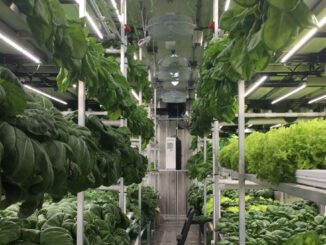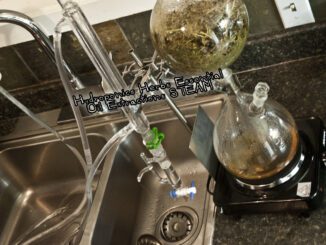
Arlington vertical farm aims to be a ‘game changer for nutrition’ in food deserts
Area 2 Farms Arlington | Victoria Sanchez |
ARLINGTON, Va. (7News) — Tucked between an autobody shop and doggy daycare, an organic vertical farm is growing acres of produce year-round in just a few thousand feet of an Arlington warehouse.
Area 2 Farms put down roots just off Four Mile Run Road in 2022. A passing pet parent or driver seeking car repair might overlook the new neighbor if it wasn’t for the large, green-painted door. Even with the bright white letters spelling out Area 2 Farms, it’s hard to believe what’s behind the brick building’s façade.
“This is the farm,” Jackie Potter told 7News Health and Wellness Reporter Victoria Sanchez as the pair walked through the humid warehouse.

Arlington vertical farm aims to be a ‘game changer for nutrition’ in food deserts (7News)
Potter held back a transparent curtain to reveal a towering device that held eight levels of growing greens that reached nearly to the corrugated ceiling.
“Our growing apparatus is called Silo and it helps us replicate our plants’ day cycle very naturally,” she explained.
“The bottom two layers here are not lit. So, this is where the plants are ‘sleeping’ and then they’ll come up to this third layer, they will get watered, they’ll heat up, their morning will start to happen and they’ll flow all the way through the entire apparatus.”
Potter is the marketing coordinator and said the new venture is planning to grow fresh food in city centers. Getting that idea to take root took some convincing.
“It was a little difficult to get landlords to take a chance on a farm,” she said. “The landlord was so nice to take a chance on us.”
Buildings left vacant after COVID have owners and cities exploring new occupant options.
“What’s the legality of putting a farm in let’s say, an empty office space?” Sanchez asked.
“It all kind of depends on which building it is and what the landlord says. We really just need an outlet and some water,” said Potter.
Silo rotates the seedlings through a 24-hour cycle, mimicking a traditional farm. But move over Old MacDonald, this updated urban farm’s mascots are Toy Story characters. You can find the radishes under the watchful eye of Stinky Pete, Rex guards the green onions and the heavy lifting is left to the rest of the bunch.
“Once (the plants are) at the top, they’ll get dropped down by Claw or Slinky or Buzz Lightyear or Zurg or whoever is helping us,” Potter said as she pointed to the plastic toy attached to a mechanical pulley.

Vertical farm in Arlington, Virginia. (7News)
Everything grown here stays in the community. The greens, herbs and root vegetables are harvested and delivered weekly to subscribers for $40 to $45 a week.
“In urban areas, there’s what they call ‘food deserts’ where you might have a McDonald’s and a Wendy’s and the closest grocery store is going to be a few miles away where people can’t get to. Could this help with that?” Sanchez asked.
According to the USDA’s Food Access Research Atlas, all of DC’s food deserts are east of the Anacostia River.
“If we can bring a farm there, the fresh access to food, especially lower-income areas is huge. They are receiving bags of chips or other things to help aid with the food desert but if we were to bring a farm there, I mean that’s a game changer for nutrition,” Potter said.

Vertical farm in Arlington, Virginia. (7News)
Area 2 Farms is working to make its produce available through SNAP and WIC benefits that help low-income families supplement their grocery budget for fresh and healthy ingredients.
For many people, “organic” and “farm-to-table” are luxuries. It’s something Area 2 Farms believes the country can grow out of.
“We can do this, we can bring our farms back,” Potter said.



